Module 10 Unit 3 Language in use课件2023-2024学年度外研版英语八年级下册
文档属性
| 名称 | Module 10 Unit 3 Language in use课件2023-2024学年度外研版英语八年级下册 |
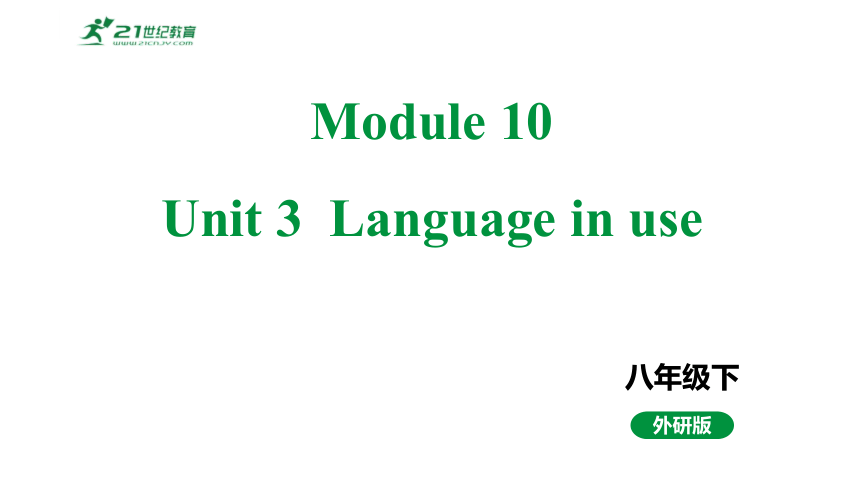
|
|
| 格式 | pptx | ||
| 文件大小 | 2.9MB | ||
| 资源类型 | 试卷 | ||
| 版本资源 | 外研版 | ||
| 科目 | 英语 | ||
| 更新时间 | 2024-04-26 15:11:11 | ||
图片预览

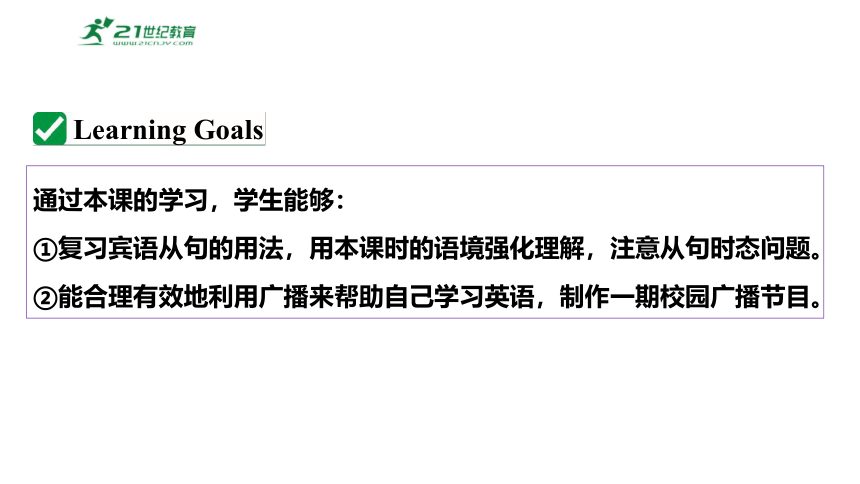
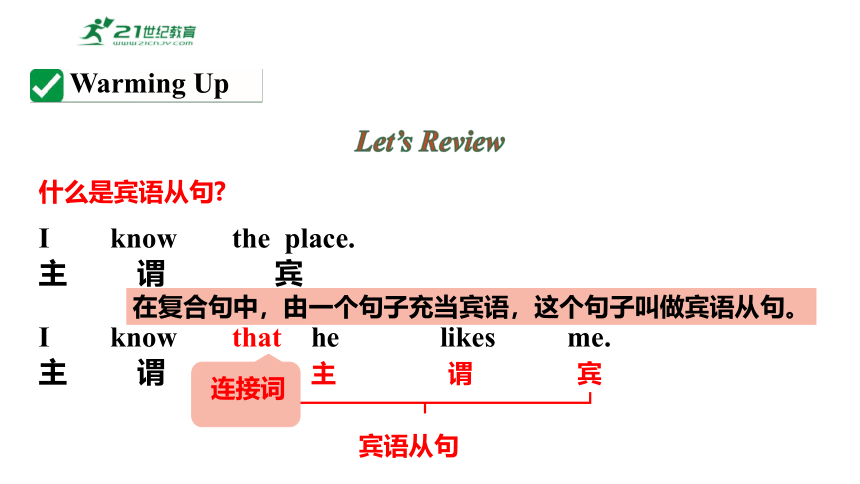
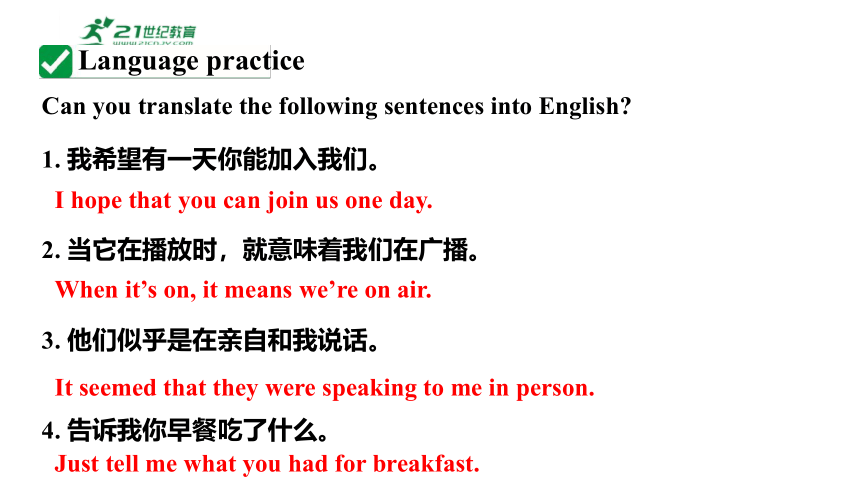
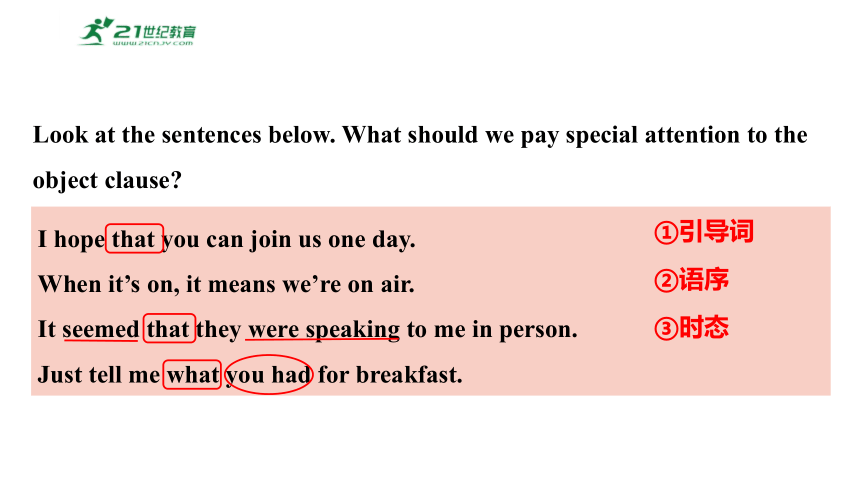
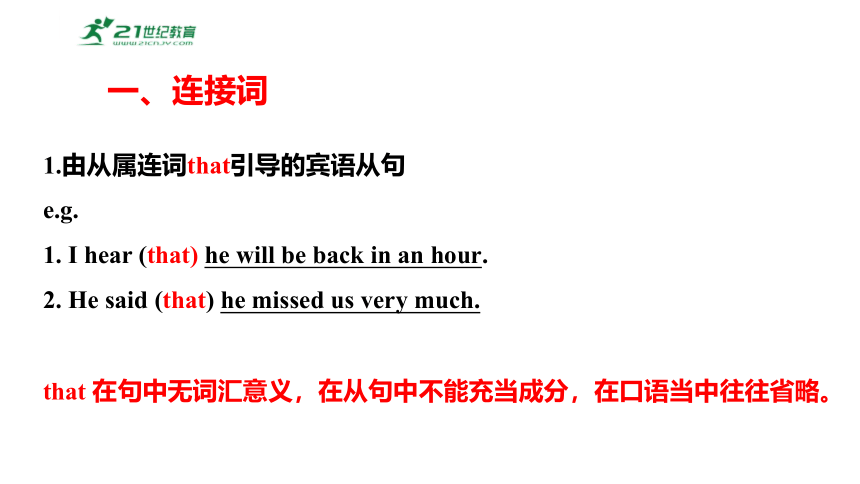
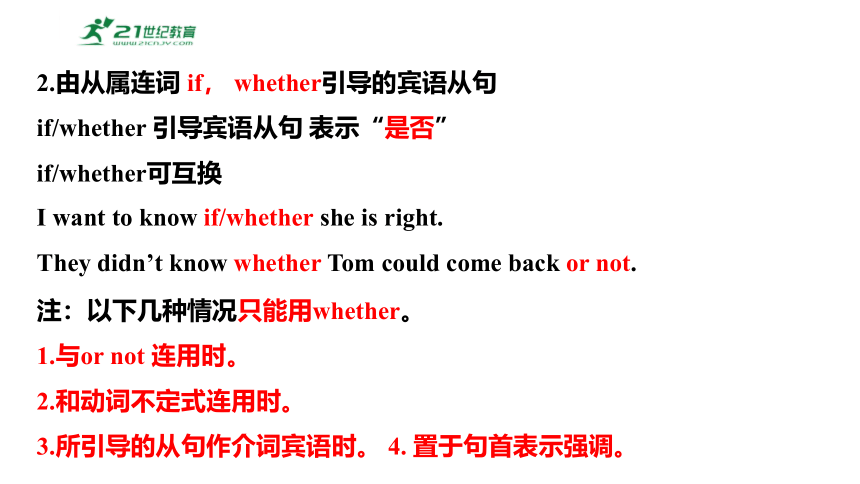
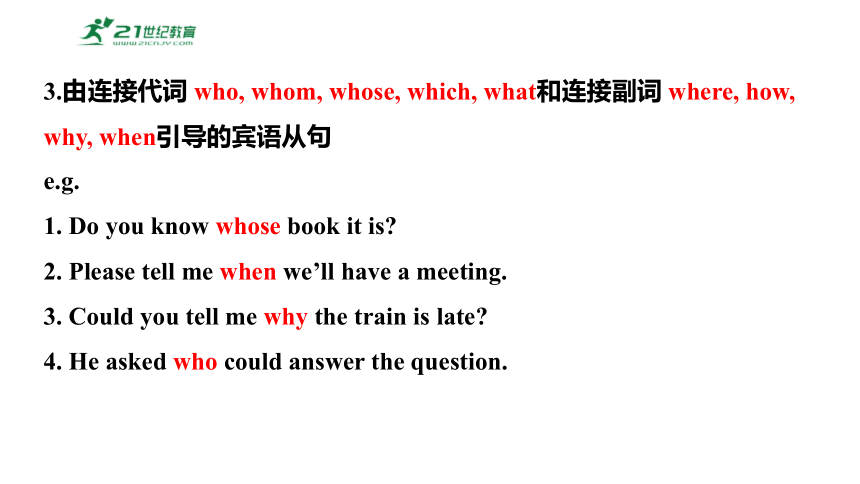
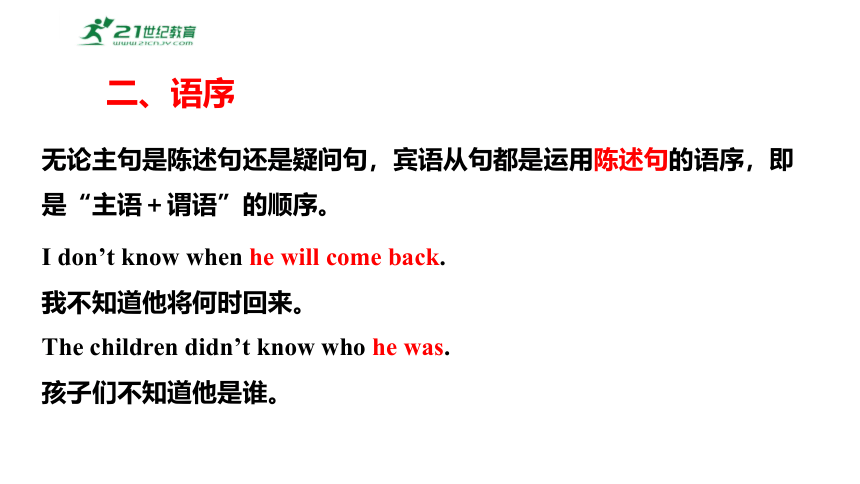
文档简介
(共29张PPT)
Module 10
Unit 3 Language in use
八年级下
外研版
通过本课的学习,学生能够:
①复习宾语从句的用法,用本课时的语境强化理解,注意从句时态问题。
②能合理有效地利用广播来帮助自己学习英语,制作一期校园广播节目。
Learning Goals
Let’s Review
什么是宾语从句
I know the place.
主 谓 宾
I know that he likes me.
主 谓 主 谓 宾
宾语从句
在复合句中,由一个句子充当宾语,这个句子叫做宾语从句。
连接词
Warming Up
Language practice
Can you translate the following sentences into English
1. 我希望有一天你能加入我们。
2. 当它在播放时,就意味着我们在广播。
3. 他们似乎是在亲自和我说话。
4. 告诉我你早餐吃了什么。
I hope that you can join us one day.
When it’s on, it means we’re on air.
Just tell me what you had for breakfast.
It seemed that they were speaking to me in person.
I hope that you can join us one day.
When it’s on, it means we’re on air.
It seemed that they were speaking to me in person.
Just tell me what you had for breakfast.
Look at the sentences below. What should we pay special attention to the object clause
①引导词
②语序
③时态
一、连接词
1.由从属连词that引导的宾语从句
e.g.
1. I hear (that) he will be back in an hour.
2. He said (that) he missed us very much.
that 在句中无词汇意义,在从句中不能充当成分,在口语当中往往省略。
2.由从属连词 if, whether引导的宾语从句
if/whether 引导宾语从句 表示“是否”
if/whether可互换
I want to know if/whether she is right.
They didn’t know whether Tom could come back or not.
注:以下几种情况只能用whether。
1.与or not 连用时。
2.和动词不定式连用时。
3.所引导的从句作介词宾语时。 4. 置于句首表示强调。
3.由连接代词 who, whom, whose, which, what和连接副词 where, how, why, when引导的宾语从句
e.g.
1. Do you know whose book it is
2. Please tell me when we’ll have a meeting.
3. Could you tell me why the train is late
4. He asked who could answer the question.
二、语序
无论主句是陈述句还是疑问句,宾语从句都是运用陈述句的语序,即是“主语+谓语”的顺序。
I don’t know when he will come back.
我不知道他将何时回来。
The children didn’t know who he was.
孩子们不知道他是谁。
三、时态
主句 从句
一般现在时
一般过去时
一般过去时
任何时态
过去的某种时态
一般现在时(客观真理或约定俗成)
I hear (that)
Jim went to school an hour ago.
he is interested in English.
she will go home tomorrow.
Tom has been to New York twice.
He said (that)
He would go to Bei jing.
He was sad.
He was listening to the music .
the earth moves around the sun.
1 The listeners tell us...
2 They were happy to know...
3 He asked...
4 Did they know...
5 Have you heard...
1 Match the two parts of the sentences.There may be more than one possibility.
a)...when she came into this room.
b)...what they want to hear.
c)...that they won the first prize last week.
d)...that he will come?
e)...what he was doing at that time?
b
c
a
d/e
d/e
2 Complete the conversation with the words in the box
how if that when who why
Tony: Hello, everyone! Thanks for waiting— now I can tell you (1) _____ has won the English Writing Competition. It’s Lingling! Lingling, tell us, (2) _____ do you feel
Lingling: Well, I feel great. I was quite surprised (3) _______ I heard (4) ______I was the winner.
Tony: I don’t know (5) _______ you were surprised. You’ve always been the best at writing in the school.
who
how
when
that
why
how if that when who why
Lingling: I don’t know about that! A lot of other students are good at writing as well.
Tony: But there’s only one winner. Well done, Lingling! What’s the prize
Lingling: It’s an electronic dictionary.
Tony: Fantastic! And (6) _____ you want to read Lingling’s article, you can find it in the school magazine.
if
3 Read the conversation in Activity 2 again and complete Daming’s diary.
18th May Saturday
I have heard that Lingling (1)_____________________________________. Tony said (2) __________________________ at the news in the beginning. I know (3) ___________________an electronic dictionary, and I think (4) ________________ fantastic. I have decided (5) _________________________________. Then maybe next time I will write an article for the competition.
has won the English Writing Competition
(that) she was quite surprised
(that) the prize is/was
that’s/ (that) it’s
that I will practise my English writing
4 Complete the passage with the correct form of the expressions in the box.
be on air in person make noise show you around the end of
I am going to (1) ________________the radio station. When the red light is on, it means we (2) _________. You have to avoid(3)____________. I know some of you would like to work in radio. I will introduce you to the presenters. They will talk to you (4) _________. This screen shows us what is happening in the world. The first programme of the day starts at 5 am, and the station closes down at 12 pm. OK, that is (5)___________ the tour. Has anyone got any questions
show you around
are on air
making noise
in person
the end of
a) A newspaper reporter.
b) A radio presenter.
c) A newsreader.
5 Listen and say what Kate’s job is.
B
6 Listen again and complete Kate’s timetable.
10 am Kate __________in a park.
11 am ________________________________________.
4 pm The programme __________.
In the first part of the show, Kate__________her guests.
Then the __________comes in.This takes about_____minutes. After that is the _______________
Finally listeners __________the station and __________Kate.
7:30 pm The programme .
runs
Kate listens to the latest news on the radio.
starts
interviews
newsreader
five
weather report
phone
talk to
finishes
Listen and read after the tape.
Hello, everyone. I’m Kate. My day starts at about 10 am with a run in the park. I run for about an hour. At 11 am, I listen to the latest news on the radio. Then I meet my team and we prepare the programme.
My programme starts at 4 pm and finishes at 7:30 pm. Before I begin, I think about my listeners. I imagine that I am talking to them in person. That makes my radio show feel personal. People seem to like that.
In the first part of the show, I interview my guests. Then the newsreader comes in. The news takes about five minutes. After the news is the weather report, and then the phone-in. That’s when listeners phone the station and talk to me. It’s my favourite part of the programme.
7 Read the interview and complete the notes.
Experiences
At fifteen years old, Bernard started to __________________.
At seventeen years old, Bernard became the (2)_________ presenter of a teenage radio show.
He has worked for a national radio station for (3)_____ years now.
Opinions
To become successful, you need to (4) __________.
It is also important to (5)____________.
present music show
youngest
four
work hard
love your job
Bernard: I started presenting music shows for the school radio when I was fifteen. I became the youngest presenter of a popular national teenage radio show when I was seventeen.And then, when I went to university, I worked on the university radio station in my free time. After that, it was easy to get a job with a local radio station in a small town. And after about two years, a national radio station asked me to work for them. I’ve worked for them for four years now.
Experiences
Opinions
Bernard: Well, to become successful, you need to work hard, you know. And I’ve always worked very hard. It’s also important to love your job, and I’ve loved radio since I was quite young.
The clockwork radio
Trevor Baylis, a British inventor, was listening to a radio programme about health problems in Africa one day. He then realised how much a radio could help African people learn about health and health care. Electricity and batteries are expensive and hard to get in some parts of Africa, so he developed a clever radio that works without batteries or electricity. The clockwork or wind up radio,
Around the world
The clockwork or wind up radio, first made in South Africa in the 1990s, changed the lives of many African people. Even in tiny villages which had no electricity or other forms of communication, people began to listen to the radio, not only for entertainment, but to educate themselves too.
Making a school radio programme
8 Work in pairs. Decide what to include in your school radio programme.
News
Music
Stories
Interviews
Phone-ins
Weather reports
Module task
9 Write each section of the programme.
Decide who will write each section.
Write the reports and show them in your group.
10 Do your school radio programme. Try to record it if possible
11 Present your radio programme to the rest of the class.
that(陈述句)
if/whether(一般疑问句)
who; whom; whose; which; what ;
when; where; why; how(特殊疑问句)
连接词
时态
主句为一般现在时,从句可以是任何时态
主句为一般过去时,从句用过去的某种时态
客观真理,自然现象等不变
陈述语序
语序
宾语从句三要素
Summary
1.Grammar:
2. Topic:
make a radio programme
为你自己的播音节目写一篇新闻稿,可以是国内新闻、国际新闻、体育新闻、社区新闻、学校新闻等。写完后小组内交流,下节课选一位学生汇报。
实践与拓展
Module 10
Unit 3 Language in use
八年级下
外研版
通过本课的学习,学生能够:
①复习宾语从句的用法,用本课时的语境强化理解,注意从句时态问题。
②能合理有效地利用广播来帮助自己学习英语,制作一期校园广播节目。
Learning Goals
Let’s Review
什么是宾语从句
I know the place.
主 谓 宾
I know that he likes me.
主 谓 主 谓 宾
宾语从句
在复合句中,由一个句子充当宾语,这个句子叫做宾语从句。
连接词
Warming Up
Language practice
Can you translate the following sentences into English
1. 我希望有一天你能加入我们。
2. 当它在播放时,就意味着我们在广播。
3. 他们似乎是在亲自和我说话。
4. 告诉我你早餐吃了什么。
I hope that you can join us one day.
When it’s on, it means we’re on air.
Just tell me what you had for breakfast.
It seemed that they were speaking to me in person.
I hope that you can join us one day.
When it’s on, it means we’re on air.
It seemed that they were speaking to me in person.
Just tell me what you had for breakfast.
Look at the sentences below. What should we pay special attention to the object clause
①引导词
②语序
③时态
一、连接词
1.由从属连词that引导的宾语从句
e.g.
1. I hear (that) he will be back in an hour.
2. He said (that) he missed us very much.
that 在句中无词汇意义,在从句中不能充当成分,在口语当中往往省略。
2.由从属连词 if, whether引导的宾语从句
if/whether 引导宾语从句 表示“是否”
if/whether可互换
I want to know if/whether she is right.
They didn’t know whether Tom could come back or not.
注:以下几种情况只能用whether。
1.与or not 连用时。
2.和动词不定式连用时。
3.所引导的从句作介词宾语时。 4. 置于句首表示强调。
3.由连接代词 who, whom, whose, which, what和连接副词 where, how, why, when引导的宾语从句
e.g.
1. Do you know whose book it is
2. Please tell me when we’ll have a meeting.
3. Could you tell me why the train is late
4. He asked who could answer the question.
二、语序
无论主句是陈述句还是疑问句,宾语从句都是运用陈述句的语序,即是“主语+谓语”的顺序。
I don’t know when he will come back.
我不知道他将何时回来。
The children didn’t know who he was.
孩子们不知道他是谁。
三、时态
主句 从句
一般现在时
一般过去时
一般过去时
任何时态
过去的某种时态
一般现在时(客观真理或约定俗成)
I hear (that)
Jim went to school an hour ago.
he is interested in English.
she will go home tomorrow.
Tom has been to New York twice.
He said (that)
He would go to Bei jing.
He was sad.
He was listening to the music .
the earth moves around the sun.
1 The listeners tell us...
2 They were happy to know...
3 He asked...
4 Did they know...
5 Have you heard...
1 Match the two parts of the sentences.There may be more than one possibility.
a)...when she came into this room.
b)...what they want to hear.
c)...that they won the first prize last week.
d)...that he will come?
e)...what he was doing at that time?
b
c
a
d/e
d/e
2 Complete the conversation with the words in the box
how if that when who why
Tony: Hello, everyone! Thanks for waiting— now I can tell you (1) _____ has won the English Writing Competition. It’s Lingling! Lingling, tell us, (2) _____ do you feel
Lingling: Well, I feel great. I was quite surprised (3) _______ I heard (4) ______I was the winner.
Tony: I don’t know (5) _______ you were surprised. You’ve always been the best at writing in the school.
who
how
when
that
why
how if that when who why
Lingling: I don’t know about that! A lot of other students are good at writing as well.
Tony: But there’s only one winner. Well done, Lingling! What’s the prize
Lingling: It’s an electronic dictionary.
Tony: Fantastic! And (6) _____ you want to read Lingling’s article, you can find it in the school magazine.
if
3 Read the conversation in Activity 2 again and complete Daming’s diary.
18th May Saturday
I have heard that Lingling (1)_____________________________________. Tony said (2) __________________________ at the news in the beginning. I know (3) ___________________an electronic dictionary, and I think (4) ________________ fantastic. I have decided (5) _________________________________. Then maybe next time I will write an article for the competition.
has won the English Writing Competition
(that) she was quite surprised
(that) the prize is/was
that’s/ (that) it’s
that I will practise my English writing
4 Complete the passage with the correct form of the expressions in the box.
be on air in person make noise show you around the end of
I am going to (1) ________________the radio station. When the red light is on, it means we (2) _________. You have to avoid(3)____________. I know some of you would like to work in radio. I will introduce you to the presenters. They will talk to you (4) _________. This screen shows us what is happening in the world. The first programme of the day starts at 5 am, and the station closes down at 12 pm. OK, that is (5)___________ the tour. Has anyone got any questions
show you around
are on air
making noise
in person
the end of
a) A newspaper reporter.
b) A radio presenter.
c) A newsreader.
5 Listen and say what Kate’s job is.
B
6 Listen again and complete Kate’s timetable.
10 am Kate __________in a park.
11 am ________________________________________.
4 pm The programme __________.
In the first part of the show, Kate__________her guests.
Then the __________comes in.This takes about_____minutes. After that is the _______________
Finally listeners __________the station and __________Kate.
7:30 pm The programme .
runs
Kate listens to the latest news on the radio.
starts
interviews
newsreader
five
weather report
phone
talk to
finishes
Listen and read after the tape.
Hello, everyone. I’m Kate. My day starts at about 10 am with a run in the park. I run for about an hour. At 11 am, I listen to the latest news on the radio. Then I meet my team and we prepare the programme.
My programme starts at 4 pm and finishes at 7:30 pm. Before I begin, I think about my listeners. I imagine that I am talking to them in person. That makes my radio show feel personal. People seem to like that.
In the first part of the show, I interview my guests. Then the newsreader comes in. The news takes about five minutes. After the news is the weather report, and then the phone-in. That’s when listeners phone the station and talk to me. It’s my favourite part of the programme.
7 Read the interview and complete the notes.
Experiences
At fifteen years old, Bernard started to __________________.
At seventeen years old, Bernard became the (2)_________ presenter of a teenage radio show.
He has worked for a national radio station for (3)_____ years now.
Opinions
To become successful, you need to (4) __________.
It is also important to (5)____________.
present music show
youngest
four
work hard
love your job
Bernard: I started presenting music shows for the school radio when I was fifteen. I became the youngest presenter of a popular national teenage radio show when I was seventeen.And then, when I went to university, I worked on the university radio station in my free time. After that, it was easy to get a job with a local radio station in a small town. And after about two years, a national radio station asked me to work for them. I’ve worked for them for four years now.
Experiences
Opinions
Bernard: Well, to become successful, you need to work hard, you know. And I’ve always worked very hard. It’s also important to love your job, and I’ve loved radio since I was quite young.
The clockwork radio
Trevor Baylis, a British inventor, was listening to a radio programme about health problems in Africa one day. He then realised how much a radio could help African people learn about health and health care. Electricity and batteries are expensive and hard to get in some parts of Africa, so he developed a clever radio that works without batteries or electricity. The clockwork or wind up radio,
Around the world
The clockwork or wind up radio, first made in South Africa in the 1990s, changed the lives of many African people. Even in tiny villages which had no electricity or other forms of communication, people began to listen to the radio, not only for entertainment, but to educate themselves too.
Making a school radio programme
8 Work in pairs. Decide what to include in your school radio programme.
News
Music
Stories
Interviews
Phone-ins
Weather reports
Module task
9 Write each section of the programme.
Decide who will write each section.
Write the reports and show them in your group.
10 Do your school radio programme. Try to record it if possible
11 Present your radio programme to the rest of the class.
that(陈述句)
if/whether(一般疑问句)
who; whom; whose; which; what ;
when; where; why; how(特殊疑问句)
连接词
时态
主句为一般现在时,从句可以是任何时态
主句为一般过去时,从句用过去的某种时态
客观真理,自然现象等不变
陈述语序
语序
宾语从句三要素
Summary
1.Grammar:
2. Topic:
make a radio programme
为你自己的播音节目写一篇新闻稿,可以是国内新闻、国际新闻、体育新闻、社区新闻、学校新闻等。写完后小组内交流,下节课选一位学生汇报。
实践与拓展
同课章节目录
- Module 1 Feelings and impressions
- Unit 1 It smells delicious.
- Unit 2 I feel nervous when I speak Chinese .
- Unit 3 Language in use
- Module 2 Experiences
- Unit 1 I've also entered lots of speaking competi
- Unit 2 They have seen the Pyramids.
- Unit 3 Language in use
- Module 3 Journey to space
- Unit 1 Has it arrived yet?
- Unit 2 We have not found life on any other planet
- Unit 3 Language in use
- Module 4 Seeing the docto
- Unit 1 I haven't done much exercise since I got m
- Unit 2 We have played football for a year now
- Unit 3 Language in use
- Module 5 Cartoons
- Unit 1 It's time to watch a cartoon.
- Unit 2 Tintin has been popular for over eighty yea
- Unit 3 Language in use
- Revision module A
- Module 6 Hobbies
- Unit 1 Do you collect anything ?
- Unit 2 Hobbies can make you grow as a person.
- Unit 3 Language in use
- Module 7 Summer in Los Angeles
- Unit 1 Please write to me and send me some photos
- Unit 2 Fill out a form and come to learn English
- Unit 3 Language in use
- Module 8 Time off
- Unit 1 I can hardly believe we are in the city ce
- Unit 2 We thought somebody was moving about
- Unit 3 Language in use
- Module 9 Friendship
- Unit 1 Could I ask if you've mentioned this to he
- Unit 2 I believe that the world is what you think
- Unit 3 Language in use
- Module 10 On the radio
- Unit 1 I hope that you can join us one day
- Unit 2 It seemed that they were speaking to me in
- Unit 3 Language in use
- Revision module B
